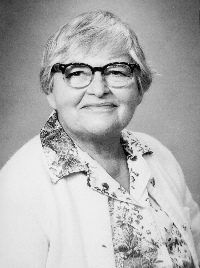Dorothy Lewis Bernstein (nonfiction): Difference between revisions
(Created page with "thumb|Dorothy Lewis Bernstein.Dorothy Lewis Bernstein (April 11, 1914 – February 5, 1988) was an American mathematician known for her wo...") |
No edit summary |
||
| Line 1: | Line 1: | ||
[[File:Dorothy_Lewis_Bernstein.jpg|thumb|Dorothy Lewis Bernstein.]]Dorothy Lewis Bernstein (April 11, 1914 – February 5, 1988) was an American mathematician known for her work in applied mathematics, statistics, computer programming, and her research on the Laplace transform. | [[File:Dorothy_Lewis_Bernstein.jpg|thumb|Dorothy Lewis Bernstein.]]'''Dorothy Lewis Bernstein''' (April 11, 1914 – February 5, 1988) was an American mathematician known for her work in applied mathematics, statistics, computer programming, and her research on the Laplace transform. | ||
She was the first | Bernstein attended North Division High School (Milwaukee) in Milwaukee, Wisconsin. In 1930 she attended the University of Wisconsin-Madison and where she held a University Scholarship (1933–1934) and was elected to Phi Beta Kappa. In 1934 she graduated with both a B.A degree, summa cum laude, and a M.A. Degree in Mathematics. She did her master's thesis research on finding complex roots of polynomials by an extension of Newton's method. In 1935 she attended Brown University, where she became a member of the scientific society Sigma Xi. She received her Ph.D. in mathematics from Brown in 1939, while simultaneously holding a teaching position at Mount Holyoke College. Her dissertation was entitled "The Double Laplace Integral" and was published in the Duke Mathematical Journal. | ||
From 1943–1959 Bernstein taught at the University of Rochester, where she worked on existence theorems for partial differential equations. Her work was motivated by non-linear problems that were just being tackled by high-speed digital computers. In 1950, Princeton University Press published her book, ''Existence Theorems in Partial Differential Equations''. | |||
She spent 1959–1979 as a professor of mathematics at Goucher College, where she was chairman of the mathematics department for most of that time (1960–70, 1974–79). | |||
She professed that she was particularly interested combining pure and applied mathematics in the undergraduate curriculum. Due in great part to Bernstein's ability to get grants from the National Science Foundation, Goucher College was the first women's university to use computers in mathematics instruction, beginning in 1961. She also developed an internship program for Goucher mathematics students to obtain meaningful employment experience. In 1972 Bernstein cofounded the Maryland Association for Educational Uses of Computers, and was interested in incorporating computers into secondary school mathematics. | |||
Bernstein was very active in the Mathematical Association of America, where she was on the board of governors from 1965 to 1968. She served as the vice president in 1972–73, and later became the first female president of the MAA in 1979–80. | |||
== In the News == | == In the News == | ||
Latest revision as of 12:02, 19 March 2017
Dorothy Lewis Bernstein (April 11, 1914 – February 5, 1988) was an American mathematician known for her work in applied mathematics, statistics, computer programming, and her research on the Laplace transform.
Bernstein attended North Division High School (Milwaukee) in Milwaukee, Wisconsin. In 1930 she attended the University of Wisconsin-Madison and where she held a University Scholarship (1933–1934) and was elected to Phi Beta Kappa. In 1934 she graduated with both a B.A degree, summa cum laude, and a M.A. Degree in Mathematics. She did her master's thesis research on finding complex roots of polynomials by an extension of Newton's method. In 1935 she attended Brown University, where she became a member of the scientific society Sigma Xi. She received her Ph.D. in mathematics from Brown in 1939, while simultaneously holding a teaching position at Mount Holyoke College. Her dissertation was entitled "The Double Laplace Integral" and was published in the Duke Mathematical Journal.
From 1943–1959 Bernstein taught at the University of Rochester, where she worked on existence theorems for partial differential equations. Her work was motivated by non-linear problems that were just being tackled by high-speed digital computers. In 1950, Princeton University Press published her book, Existence Theorems in Partial Differential Equations.
She spent 1959–1979 as a professor of mathematics at Goucher College, where she was chairman of the mathematics department for most of that time (1960–70, 1974–79).
She professed that she was particularly interested combining pure and applied mathematics in the undergraduate curriculum. Due in great part to Bernstein's ability to get grants from the National Science Foundation, Goucher College was the first women's university to use computers in mathematics instruction, beginning in 1961. She also developed an internship program for Goucher mathematics students to obtain meaningful employment experience. In 1972 Bernstein cofounded the Maryland Association for Educational Uses of Computers, and was interested in incorporating computers into secondary school mathematics.
Bernstein was very active in the Mathematical Association of America, where she was on the board of governors from 1965 to 1968. She served as the vice president in 1972–73, and later became the first female president of the MAA in 1979–80.
In the News
Fiction cross-reference
Nonfiction cross-reference
External links:
- Dorothy Lewis Bernstein @ Wikipedia
